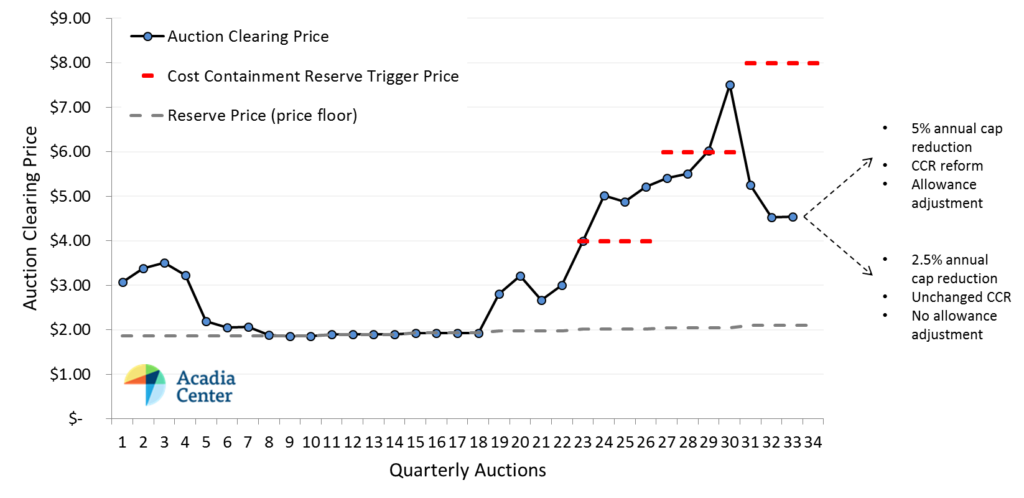Low RGGI Auction Prices Suggest Need for Greater Ambition
BOSTON — The results of today’s Regional Greenhouse Gas Initiative auction indicate that participating states have ample room to strengthen the program. Low emissions prices reflect the continuing decline of regional emissions and a growing oversupply of allowances. Without measures to significantly strengthen RGGI, the oversupply of allowances is likely to increase following recent commitments to foster zero-carbon energy. As detailed in our recent report, new commitments to clean energy in Massachusetts, Rhode Island, and Connecticut will reduce emissions by 45 million tons from 2020 to 2030, and New York has signaled support for the continued operation of existing nuclear facilities.
In the latest auction all 14,911,315 available allowances were sold at a clearing price of $4.54, which is nearly identical to the the previous auction ($4.53) and 25% lower than the clearing price from one year ago. The RGGI states raised $67,697,370 dollars from Auction 33, and have now raised $2.58 billion for reinvestment since the program began, the majority of which has been used to fund energy efficiency and other consumer benefit programs. Auction 33 coincides with the final stretch of the 2016 Program Review. As the RGGI states work to reach consensus on program reforms, the results of this auction and recent market trends should help to inform the decision-making process.
“RGGI emissions through the first half of 2016 were the lowest they have been in the program’s history, and annual emissions have been below the RGGI cap level in each of the program’s seven years to date,” said Acadia Center President, Daniel Sosland. “This shows that emissions are falling quickly and even more cost-effectively than expected and provides the foundation on which RGGI states can feel confident going forward to set more ambitious emission targets.”
Given the low volume of trades that have taken place since the previous auction and the relatively modest change in prices, Auction 33 may be viewed as an inflection point, as many market participants are waiting to see what the RGGI states do next in the Program Review. If the RGGI states announce measures that will result in greater stringency, such as an annual 5% cap decline, adjustment for banked allowances and cost containment reserve (CCR) reform, the RGGI market will likely recover. On the other hand, failing to commit to a future allowance adjustment, leaving the CCR unchanged, and establishing a less ambitious post-2020 cap would signal a long-term oversupply.
“The RGGI states showed great foresight during the previous Program Review by dramatically reducing the cap and adjusting for banked allowances,” said Peter Shattuck, Director of Acadia Center’s Clean Energy Initiative. “Now, four years later, continued emissions declines necessitate similar measures. Establishing ambitious cap levels and committing to future allowance adjustment will help propel the region’s clean energy transition.”
“An oversupplied market and low RGGI prices limited the program’s impact in its early years,” said Jordan Stutt, Policy Analyst with Acadia Center. “Failing to strengthen RGGI through the Program Review could result in similarly low prices, depriving the region of funding for clean energy programs and sending inadequate market signals to clean up the region’s power sector.”
Information on the 2016 RGGI Program Review, including meeting materials and stakeholder comments, can be found at: http://www.rggi.org/design/2016-program-review
Additional information on RGGI’s performance to date and needed reforms through the 2016 Program Review are described in Acadia Center’s recent RGGI Status Report:
- Part I: Measuring Success
- Part II: Achieving Climate Commitments
RGGI Overview:
The Regional Greenhouse Gas Initiative (RGGI) is the first mandatory, market-based effort in the United States to reduce greenhouse gas emissions. Nine northeastern and mid-Atlantic states reduce CO2 emissions by setting an overall limit on emissions “allowances,” which permit power plants to dispose of CO2 in the atmosphere. States sell allowances through auctions and invest proceeds in consumer benefit programs: energy efficiency, renewable energy, and other programs.
The official RGGI web site is: www.rggi.org
###
Acadia Center is a non-profit, research, and advocacy organization committed to advancing the clean energy future. Acadia Center is at the forefront of efforts to build clean, low-carbon, and consumer-friendly economies. Acadia Center provides accurate and reliable information and offers a real-world and comprehensive approach to problem solving through innovation and collaboration.



















